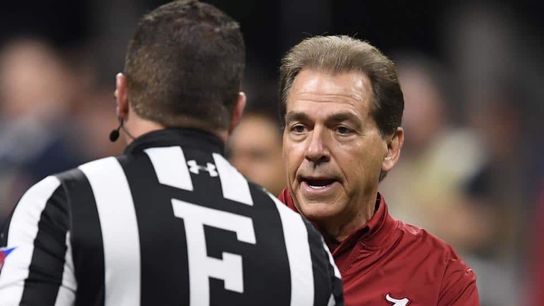While working on this piece, I can't help but think back to exactly one year ago today.
It's the district finals in Michigan featuring two teams ranked in the top 4 in their respective division in the state in a game that had all the makings of a semi-final or state title match up. We're in overtime and inside the 3-yard line down 7 points. We snap the ball and plunge into the end zone to tie the game and are a PAT away from forcing a second overtime.
But a flag gets thrown by head official behind the play. The call? "Illegal shift."
Despite my best efforts, I couldn't get an explanation from anyone on the call. It was second down so I moved on to the next play call, but long story short, we weren't able to punch it in after the penalty.
I have watched the play at least a hundred times on film. I don't see a thing. To have a team that you feel like was capable of making a deep run and possibly winning a state title if the stars aligned to go out like that was a tough pill to swallow.
Like most coaches that have found themselves in situations like that, I wanted answers. I wanted accountability. I didn't get either. I thought that there surely has to be a better way.
Fast forward a year, and I'm at a different school, in a different league. Comstock Park high school, located just outside of Grand Rapids plays in the Ottawa-Kent Conference. The league consists of over 50 member schools located across seven counties that is split into six divisions. Those divisions range from about 350 kids in the small school divisions to the larger school divisions that top off at 2,600 kids.
Over the weekend I saw a tweet from a frustrated coach on some missed calls (accompanied by film) during a playoff game, and I responded by sharing that the OK Conference does something really unique when it comes to educating coaches and officials that I feel is worth sharing.
After each game involving an OK-Conference school, coaches are asked to submit their film via Hudl to the league's supervisor of officials, and then send an email with the play numbers of the plays in question. For me, those plays have ranged anywhere from "why was this called" type situations, to "how was this one missed?"
The dialogue that comes from it has been invaluable. Coaches like me are able to share our point of view, and get an unbiased point of view in return. Oftentimes the dialogue we get in return doesn't support our original viewpoint, but there are also moments in the feedback we get that is honest and humanizing in a powerful way that helps coaches and officials both keep some important perspective.
The goal of the open communication is clear: provide an open dialogue between coaches and officials after the dust settles from games that allows both sides an opportunity to learn and get better. Could this be an avenue to help remedy the official shortage and heal the fractured coach-officials relationship? I certainly think it's worth a shot.
Seems like such a simple win-win for all involved, yet after I sent a tweet about how grateful I am for the way the league has set it up, I had a number of coaches reach out in surprise about why more states and conferences aren't doing something similar.
This is a no-brainer guys. If your league isn't doing it, it's something worth having a conversation about, and fighting for.
